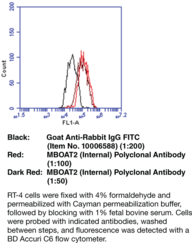Territorial Availability: Available through Bertin Technologies only in France
- Correlated keywords
- MBOAT diabetes obesity atherosclerosis Alzheimer’s disease Lands cycle lysophosphatidylethanolamine phosphotidylethanolamine lysophosphatidic phosphatidic acid acylation transmembrane enzyme lipid biosynthesis antibodies antibody fatty binding protein flow cytometry obesity immunocytochemistry immunofluorescence ELISA phospholipid immunochemical detection internal PE LPE LPA PA mediate conversion activate reacylation RT-4 RT4 cells ICC FC MBOAT2 embryogenesis nutrient sensing remodeling FLJ14415 FLJ-14415 FLJ90298 FLJ-90298 OACT2 OACT-2 lysophospholipid acyltransferase LPLAT 2 LPLAT2 protein lipidation
- Product Overview:
Membrane-bound O-acyltransferase 2 (MBOAT2) is a membrane-spanning enzyme of the MBOAT family encoded by the LPCAT4 gene in humans.{27302} It contains multiple transmembrane domains and has two active site residues, an asparagine and a histidine, in common with other MBOAT family members.{27302} MBOAT2 is expressed in mouse epididymis, brain, testis, and ovary and is localized to the endoplasmic reticulum in CHO cells.{35639} MBOAT2 has acyltransferase activities, with a preference for using oleoyl-coenzyme A (oleoyl-CoA) as an acyl donor and lysophosphatidylethanolamine (Item No. 25844), lysophosphatidic acid, or lysophosphatidylcholine (Item No. 24331) as acyl acceptors at the sn-2 position.{27123} MBOAT2 expression is increased in the epithelia of patient-derived pancreatic ductal adenocarcinoma (PDAC) tumor tissue and this expression is inversely correlated with patient survival.{56207} In contrast, decreased expression of serum circular MBOAT2 RNA levels are found in patients with hypertrophic cardiomyopathy.{56208} Cayman’s MBOAT2 (Internal) Polyclonal Antibody can be used for flow cytometry and immunofluorescence applications. The antibody recognizes the internal (cytoplasmic) portion of MBOAT2.
Cayman Chemical’s mission is to help make research possible by supplying scientists worldwide with the basic research tools necessary for advancing human and animal health. Our utmost commitment to healthcare researchers is to offer the highest quality products with an affordable pricing policy.
Our scientists are experts in the synthesis, purification, and characterization of biochemicals ranging from small drug-like heterocycles to complex biolipids, fatty acids, and many others. We are also highly skilled in all aspects of assay and antibody development, protein expression, crystallization, and structure determination.
Over the past thirty years, Cayman developed a deep knowledge base in lipid biochemistry, including research involving the arachidonic acid cascade, inositol phosphates, and cannabinoids. This knowledge enabled the production of reagents of exceptional quality for cancer, oxidative injury, epigenetics, neuroscience, inflammation, metabolism, and many additional lines of research.
Our organic and analytical chemists specialize in the rapid development of manufacturing processes and analytical methods to carry out clinical and commercial GMP-API production. Pre-clinical drug discovery efforts are currently underway in the areas of bone restoration and repair, muscular dystrophy, oncology, and inflammation. A separate group of Ph.D.-level scientists are dedicated to offering Hit-to-Lead Discovery and Profiling Services for epigenetic targets. Our knowledgeable chemists can be contracted to perform complete sample analysis for analytes measured by the majority of our assays. We also offer a wide range of analytical services using LC-MS/MS, HPLC, GC, and many other techniques.
Accreditations
ISO/IEC 17025:2005
ISO Guide 34:2009
Cayman is a leader in the field of emerging drugs of abuse, providing high-purity Schedule I-V Controlled Substances to federally-licensed laboratories and qualified academic research institutions for forensic analyses. We are certified by ACLASS Accreditation Services with dual accreditation to ISO/IEC 17025:2005 and ISO Guide 34:2009.





